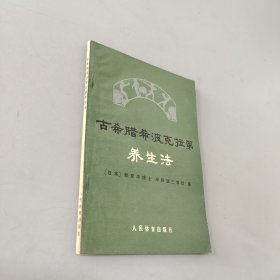
古希腊演讲集 伊苏克拉底 I 英文原版 isocrates I
¥ 168 3.8折 ¥ 443 九五品
仅1件
广东广州
认证卖家担保交易快速发货售后保障
作者Michael Gagarin
出版社University of Texas Press
ISBN9780292752382
出版时间2000-11
印刷时间2000-11
印数1千册
装帧平装
开本32开
纸张轻型纸
页数311页
字数1千字
定价443元
上书时间2024-10-19
- 最新上架
商品详情
- 品相描述:九五品
- 商品描述
-
基本信息
Format Paperback | 311 pages
Dimensions 140 x 216 x 25.4mm | 408.23g
Publication date 01 Nov 2000
Publisher University of Texas Press
Language English
ISBN10 0292752385
ISBN13 9780292752382
页面参数仅供参考,具体以实物为准
书籍简介
这是《古希腊演讲集》系列的第四卷。这套丛书计划分几年出版,将把公元前五世纪晚期和四世纪的所有现存演讲稿以新的译本呈现给读者,这些译本由处于该学科前沿的古典学者编写。这些译本是专门为今天的本科生、其他学科的无希腊语学者以及普通公众的需要和兴趣而设计的。古典演说是研究古希腊生活和文化的宝贵资源。这些演说提供了关于希腊道德观、社会和经济状况、政治和社会意识形态以及雅典文化其他方面的证据,这些方面在很大程度上被忽略了:妇女和家庭生活、奴隶制和宗教,仅举几例。本卷包含雅典修辞学家伊苏克拉底(436-338)早期、中期和晚期的作品。在翻译的作品中,有他的法律演讲、教育学论文,以及他的长篇自传式答辩《Antidosis》。在这些作品中,他试图将自己和自己的工作(他称之为 "哲学")与诡辩家和其他知识分子(如柏拉图)的工作区分开来。伊苏克拉底的教师身份是一种重要的政治活动方式,他试图通过这种方式来指导他的学生、外国统治者和他的雅典同胞。他是一个有争议的人物,支持书面文字在四世纪的政治和思想中发挥作用。
This is the fourth volume in the Oratory of Classical Greece series. Planned for publication over several years, the series will present all of the surviving speeches from the late fifth and fourth centuries B.C. in new translations prepared by classical scholars who are at the forefront of the discipline. These translations are especially designed for the needs and interests of today's undergraduates, Greekless scholars in other disciplines, and the general public. Classical oratory is an invaluable resource for the study of ancient Greek life and culture. The speeches offer evidence on Greek moral views, social and economic conditions, political and social ideology, and other aspects of Athenian culture that have been largely ignored: women and family life, slavery, and religion, to name just a few. This volume contains works from the early, middle, and late career of the Athenian rhetorician Isocrates (436-338). Among the translated works are his legal speeches, pedagogical essays, and his lengthy autobiographical defense, Antidosis. In them, he seeks to distinguish himself and his work, which he characterizes as "philosophy," from that of the sophists and other intellectuals such as Plato. Isocrates' identity as a teacher was an important mode of political activity, through which he sought to instruct his students, foreign rulers, and his fellow Athenians. He was a controversial figure who championed a role for the written word in fourth-century politics and thought.
作者简介
迈克尔·加加林是德克萨斯大学奥斯汀分校古典学系的教授。
Michael Gagarin is a professor in the Classics department at University of Texas at Austin.
Translated by David C. Mirhady , Translated by Yun Lee Too
相关推荐
— 没有更多了 —


























以下为对购买帮助不大的评价